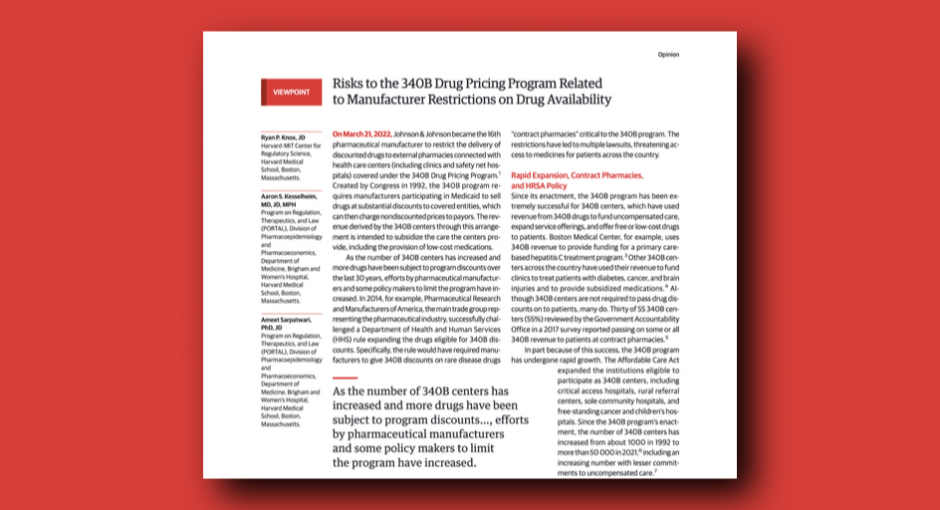A nationally prominent drug policy expert and two colleagues at Harvard Medical School have written in JAMA how Congress could end the fight over 340B contract pharmacy and enhance 340B program integrity.
“First, Congress could explicitly allow the participation of contract pharmacies in the 340B program given their importance in securing revenue for 340B [covered entities] and ensuring patient access to low-cost drugs,” Aaron Kesselheim, Ryan Knox, and Ameet Sarpatwari say in an opinion article published online on April 15.
“Second, to ensure the 340B program is functioning effectively, Congress could delegate rulemaking powers to HRSA [the U.S. Health Resources and Services Administration] to develop and enforce standards for preventing drug diversion and duplicate discounting,” the three researchers said.
A medical doctor, lawyer, and public health expert, Kesselheim is one of America’s leading authorities on prescription drug prices and drug policy reform. He gave the keynote speech at the 340B Coalition 2017 summer conference. Knox is a postdoctoral research fellow at the Harvard-MIT Center for Regulatory Science at Harvard Medical School. Sarpatwari is an assistant professor of medicine at Harvard Medical School and assistant director of the Program on Regulation, Therapeutics, and Law (PORTAL) within the Division of Pharmacoepidemiology and Pharmacoeconomics at Brigham and Women’s Hospital. Kesselheim created and leads PORTAL.
The JAMA article examines risks to the 340B program posed by drug manufacturers’ conditions on 340B pricing when covered entities use contract pharmacies.
Contract pharmacies are “critical to the 340B program,” the authors say, because many 340B covered entities do not have their own pharmacies, and many patients do not live close to the 340B entity where they receive care. The authors also note that manufacturers argue that that rapid 340B contract pharmacy has compounded problems with diversion and duplicate discounts.
The Harvard scholars balanced their call for legislation explicitly allowing 340B contract pharmacy with a call for legislation “to prevent contract pharmacies from obtaining revenue not intended for uncompensated care.”
“Congress could set additional requirements for eligibility, for example, ensuring contract pharmacies are physically located in low-income communities served by the 340B [covered entity], and could require annual reporting of 340B revenue spending to HRSA,” the authors said. “Such steps could help promote access to medicines while keeping contract pharmacy arrangements consistent with the original purposes of the 340B program.”
If Congress gave HRSA comprehensive rulemaking authority over the 340B program, they said, the agency could use that power to require “use of a 340B identifier on all pharmacy claims, additional reporting requirements for managed care Medicaid claims, and auditing of 340B [entities’] compliance with state Medicaid policies on duplicate discounting prevention.”
The JAMA article comes amid growing talk about potential federal 340B legislation, driven by the 340B contract pharmacy crisis.
Kesselheim in the News
Kesselheim made headlines last year for resigning from a U.S. Food and Drug Administration advisory committee over the FDA’s approval of the Alzheimer’s disease drug Aduhelm because of its high price and because “there’s no good evidence that the drug works.”
During a U.S. Senate hearing in March 2021, Kesselheim was asked to talk about the 340B program’s importance.
“There’s no doubt the fact that 340B pricing is among the best prices we offer for certain high-cost drugs,” Kesselheim said. However, he also noted that the program “has expanded over the years perhaps beyond what was originally intended,” which he said has triggered discussions about which hospitals should qualify for the program.
Kesselheim supervised, obtained funding for, and helped design a study published in JAMA Internal Medicine in November 2021 on what 340B and non-340B hospitals charge commercial insurers for physician administered drugs. It found “considerable markups” particularly at 340B hospitals and said more research is needed on how 340B entities use revenue generated from insurers to provide care for marginalized communities.


